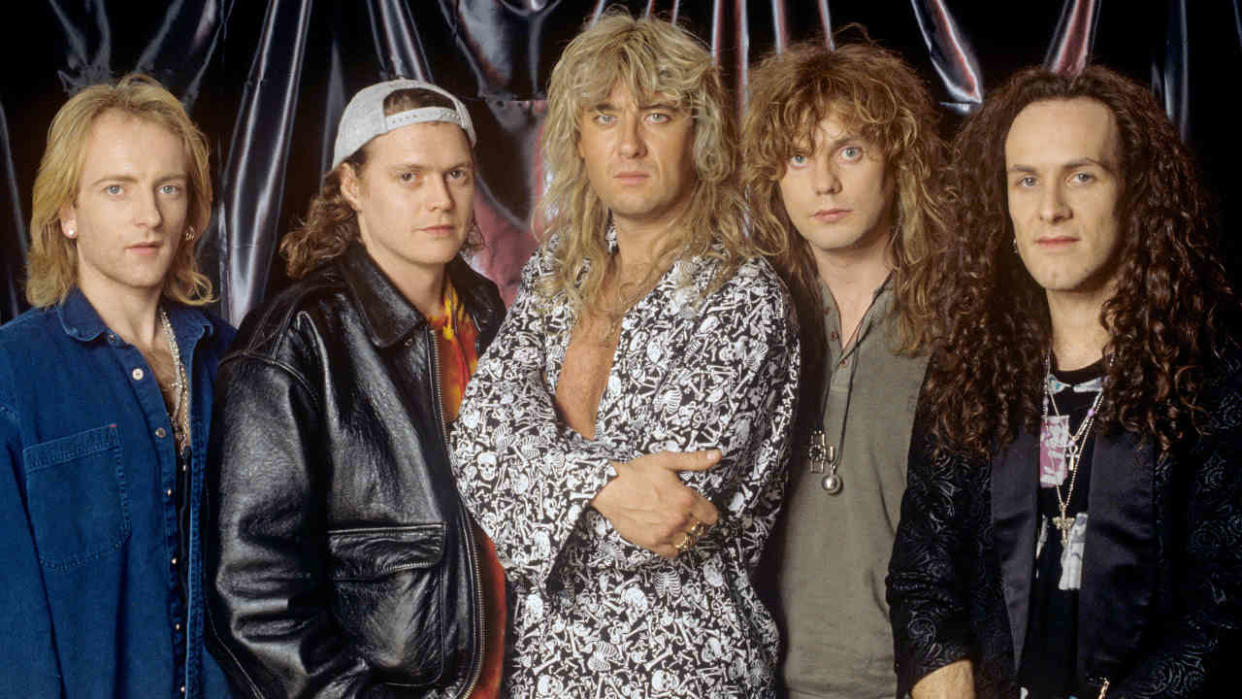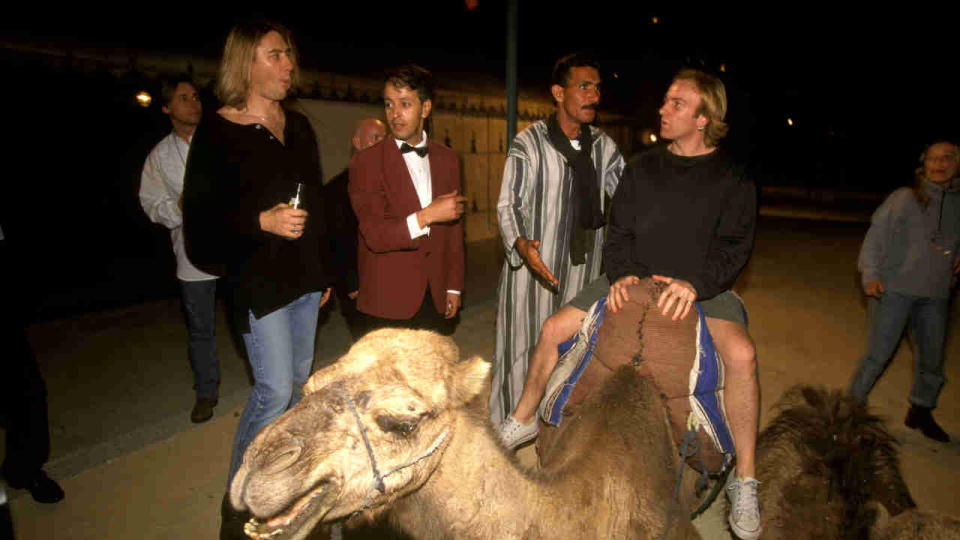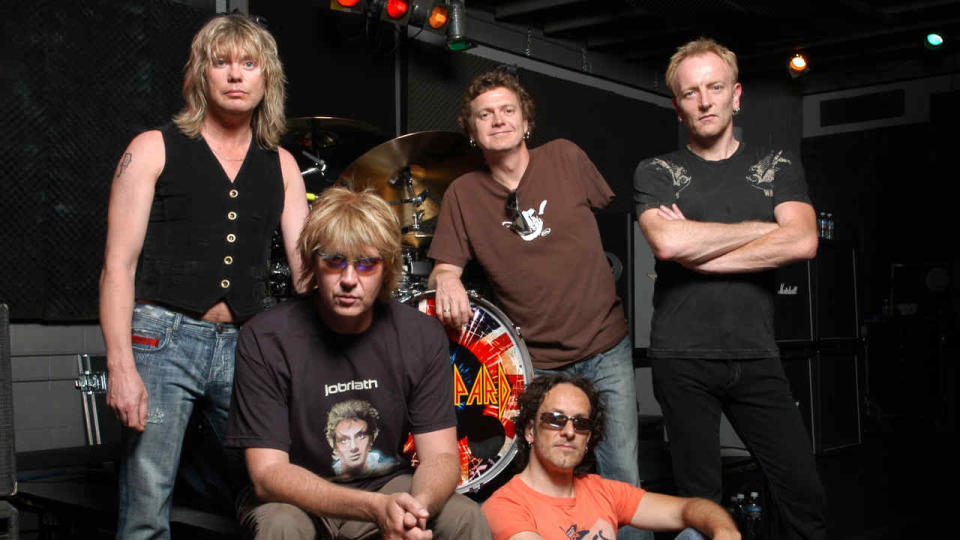“We could never be Nirvana, but we could make an album that would fit in with the times without us looking like stupid old farts”: how Def Leppard survived tragedy, grunge and the turbulent 1990s to make two of their most underrated albums

- Oops!Something went wrong.Please try again later.
- Oops!Something went wrong.Please try again later.
- Oops!Something went wrong.Please try again later.
- Oops!Something went wrong.Please try again later.
- Oops!Something went wrong.Please try again later.
It was a gamble and they knew it. In 1995, during the recording of Def Leppard’s sixth album, Slang, it had a bleakly humorous working title: Commercial Suicide. “We knew that people would wonder what the hell we were doing,” singer Joe Elliott says. “But we couldn’t make another album like Adrenalize. We had to do something else. So we did something that nobody expected. Slang was our grown-up album.”
A change in Def Leppard’s music had begun with the 1993 album Retro Active, the follow-up to Adrenalize. The sound of it was leaner, harder, less slick: partly in reaction to Adrenalize, which was, in guitarist Phil Collen’s words, “a little mechanical”; and partly in reaction to how music was developing in the early ’90s, as alternative rock had a seismic effect akin to the punk explosion of 1977, the year in which Def Leppard formed.
According to bassist Rick Savage, the band’s approach to Slang was not clearly defined from the outset. “We weren’t totally sure exactly what the direction was,” he admits, “but we knew what the direction wasn’t. We didn’t want to try to recreate Hysteria again, and we could never be Nirvana, but we could make an album that was representative of the five of us that would fit in with the times without us looking like stupid old farts.”
Not everyone was quite on the same page. Former Dio guitarist Vivian Campbell had replaced the late Steve Clark in 1992. This would be the first full album he recorded with the band.
“It was very confusing,” Vivian says. “I was making a record for the first time with the mighty Def Leppard, and it was almost as if Def Leppard was afraid to be Def Leppard. I tried not to rock the boat or ask too many questions – just go with the flow of it. But deep down I was thinking, what the fuck is going on here? As far as I could understand it, the only clear directive was that we couldn’t make a Def Leppard-sounding record.”

Vivian cites Soundgarden’s 1994 album Superunknown, and the song Black Hole Sun especially, as an influence on Def Leppard in the making of Slang. A deeper influence was in what the individual members of the group were experiencing in their personal lives.
“There was a lot of emotional turmoil going on,” Joe says. “Death and birth, marriage and divorce. None of this stuff existed when we were writing the other records. Those records were all about rocking out and having a good time. It was very different with Slang.” As Phil says: “The mood of the album was kind of dark, and it wasn’t something we did on purpose, it was just how it turned out.”
For all that, Joe recalls the recording of the album as a time of fun, as the band lived and worked together at a house in Spain that had been the setting for the second series of British comedy drama Auf Wiedersehen, Pet. “That was our home and our studio,” Joe says. “And we had a ball out there, enjoying the sunshine and creating these songs.”
Co-produced by the band with Pete Woodroffe, the album was recorded in “an old-fashioned style”, as Rick Savage calls it. “We were playing as a band, basically,” he says. “The backing tracks were almost live – how we sounded in a rehearsal room – and then we enhanced it from there.” Central to this more organic approach was drummer Rick Allen’s reversion to a semi-acoustic kit. “It was another challenge,” he says, “but I loved the feel of it.”
In this environment, new ideas came into play. “It was great for us to flex our muscles in a different way,” Phil says. “We had an orchestra playing Indian instruments on Turn To Dust, which was really exciting. And in Breathe A Sigh, we had an R&B twist to the vocals.” Vivian Campbell, for all his misgivings, wrote in Work It Out a brilliant modern rock song for the post-grunge era. As Rick Allen says, “These were songs that for Def Leppard came out of leftfield.”
Equally, there were traces of the band’s past in Gift Of Flesh and the album’s title track. “Gift Of Flesh is good proper rock stuff,” Joe says, “like UFO did on Obsession. And the title track was just a regular pop song, with a complete theft of the rundown at the end of Fame by Bowie.”
The real depth in Slang was in the three songs that ended the album – Blood Runs Cold, Where Does Love Go When It Dies, and Pearl Of Euphoria. In an echo of the song White Lightning, from Adrenalize, Joe and Phil wrote Blood Runs Cold as another eulogy for Steve Clark, only darker. “This was a more heartfelt song,” Joe says. “White Lightning was a grandiose, big movie version of Steve Clark. Blood Runs Cold was the down-and-dirty, in-the-gutter version of Steve. And that’s where we wanted this album to go.”
Where Does Love Go When It Dies has a melancholy beauty and a hard-earned wisdom in the words Joe sings. “It’s one of my favourite songs,” Rick Allen says. “The lyrical content is pretty amazing.” And in Pearl of Euphoria, a heavy sound was matched by the lyrics. “It’s about abortion,” Phil says. “A really deep song. Across the album there are religious metaphors and social metaphors. It was all pretty deep for a Def Leppard record.”
In the end, Slang was not, as the band had predicted, only half-jokingly, an act of commercial suicide. The album reached No.14 in the US, and No.6 in the UK. It was not a multi-million seller, but the band never really expected it to be. In rock music, so much had changed since the heady days of Hysteria and Adrenalize, and Slang was a reflection of that change.
For Joe Elliott, it is an album defined by “raw emotion”. He speaks of Slang as one of the most important albums that Def Leppard ever made. “To move forward,” he says, “we had to break it all down and build again. And the satisfaction that we got from that album, I couldn’t put in into words.”

For all the darkness and emotional intensity in Slang, the album had a positive effect on the band. “It really refreshed us,” Rick Savage says, “and gave us an appetite to be natural and enjoy it again.” And what this led to was an album with a title that spoke volumes: Euphoria.
This title, already in place before the album was made, had echoes of Pyromania and Hysteria, the mega-hits that had transformed Def Leppard into the biggest British rock group since Led Zeppelin and Queen. And with this came a sense of a band re-embracing its own history and its true identity. As Joe says: “Music moves in cycles. Slang was ground zero, and with Euphoria it was a new start. We reinstalled the harmonies on that record. The songs were more melodic. It was about us feeling good about who we were.”
What also fed into Euphoria was the sense among the members of Def Leppard that the cyclical nature of music had, in the end stages of the 1990s, turned to their advantage. As Phil Collen says: “When we started on Euphoria, all of a sudden there was Britney Spears and Ricky Martin out there. Music was happy again, it wasn’t miserable.”
There was, as Vivian Campbell recalls, a mood of cautious optimism within the band. “With Euphoria, we were peeking our heads over the fence,” he laughs. “Is it safe to come out now? That’s how it felt. But we were starting to see signs that it was okay to be ourselves again. We were hearing slickly crafted, producer-driven pop songs on the radio. That was a strong indicator that we could make a proper Def Leppard record. So there was a strong and clear concept going into Euphoria, and it began with the title of the album. It was a return to the classic Def Leppard sound.” Rick Allen puts is simply. “If you leave it enough time, it will come back into fashion and people will like it again.”
Another significant development was the return of the band’s unofficial “sixth member” Mutt Lange, albeit in a more limited role than before. The last Def Leppard album with Lange as producer was Hysteria. On Euphoria, as on Slang, the band co-produced with Pete Woodroffe. But in this album’s key track, Promises – chosen as the flagship single for what Phil Collen describes as its “classic Def Leppard feel” – it was Lange who turned a good song into a great one.
The riff in Promises, written by Phil, had a tone and rhythm reminiscent of the band’s classic 1983 single Photograph. But as Vivian says, “We couldn’t find the chorus. And that was when that song was sent off to Mutt. He was living in Switzerland and we were recording in Dublin. We sent him the multi-track, he sliced it and diced it and sent it back to us a week or two later – and when we heard it we went, ‘Oh fuck – there’s the chorus!’”
Lange subsequently flew in to Dublin to work with the band over a long weekend, in which time they co-wrote two more songs: It’s Only Love and All Night. Of the latter, Joe says: “That song is bonkers, a little like Let’s Get Rocked was – a funky jam with mad sections that are atonal, melodically wrong, but it has a unique flavour.” During that weekend, they also recorded backing vocals with Lange, and the combination of his voice and theirs – so integral to the sound of the band’s classic hits of the ’80s – was heard again in Promises.
There was one other song from Euphoria in which Lange had an influence. The beautiful ballad Goodbye was written by Rick Savage alone. “At that stage,” he says, “I wasn’t schooled in writing a complete song, start to finish. But I wanted to do it on a personal level. I had a demo of the song while we were doing Slang, but it didn’t feel quite right. I changed the verses. The chorus was always the same. And in the end it all came together when Mutt was with us in Dublin. He didn’t write on that song, but he was influential in directing us.”
The finished album was broad in range. Demolition Man was placed as the opening track for its energy. “The chorus is pretty manic,” Joe says, “with all of throwing lines at each other.” Fittingly, for a song that he describes as “really hard-driving”, it features a guest appearance from ex-Formula One world champion Damon Hill. Another standout track, Back In Your Face, is a throwback to the glory days of British glam rock. ‘The guitar riff is very much based in that whole glam era of ’72, ’73,” Joe says. “It’s us doing The Glitter Band – to the point where we contacted the engineer who’d worked with Mike Leander, the producer on those records, and asked, what’s the exact millisecond delay on the handclaps and the snare drum? It was a guarded secret but we managed to get it off him.”
The album also has two epic pieces. Kings Of Oblivion was inspired by the heavy sounds of the ’70s. “It’s a great, classic rock song,” Joe says. “It harks right back to the days of Uriah Heep and Wishbone Ash and Lone Star.” And on Paper Sun, similar in scale to Gods Of War from Hysteria, they went even deeper, the lyrics in this song written in the aftermath of the 1998 terrorist bombing in Omagh, Northern Ireland, which killed 29 people and left more than 200 injured. “It was such a tragedy,” Phil says. “We’re an apolitical band, but that really affected us.”
Euphoria was released on June 8, 1999. The album peaked at No.11 on the US and UK charts, while Promises made No.1 on Billboard’s Hot Mainstream Rock Tracks. For Phil Collen, Euphoria is one of Def Leppard’s best. “I’m very proud of that album,” he says. “We felt good making it, and I think you can hear it in those songs.”

Slang was a bold reinvention, Euphoria a triumphant return to the classic Def Leppard sound. It was when the band experimented again – on X, the follow-up to Euphoria – that they dropped the ball.
Joe admits there was some confusion within the band going into this album. “I think we were at a crossroads,” he says. “Internally, we were all not going in the right direction. We had some discussions about how we should go, and we had suggestions thrown at us that we should work with some outside writers, which I was completely not cool with because I knew that we were well capable of writing our own. So why would we want to do that?”
Despite his reservations, additional writers were used on five of the songs recorded for X. Now, Everyday and You’re So Beautiful were co-written by the band with Marti Frederiksen, the American songwriter who had worked with Aerosmith on the albums Nine Lives and Just Push Play. More contentiously, there was one song, Long, Long Way To Go, written by Wayne Hector, author of Westlife’s hit Flying Without Wings; and another, Unbelievable, by Swedish trio Per Aldenheim, Andreas Carlsson and Max Martin, the latter famous for writing Britney Spears’ … Baby One More Time.
As it turned out, Long, Long Way To Go, a beautiful ballad, was one of the best songs on the album. With hindsight, and damning with faint praise, Joe describes Unbelievable as “not that bad”. The songs written with Marti Frederiksen were more to Joe’s taste.
“They were kind of poppy,” he says. “Like if we’d sat down and said, ‘Let’s try and be Cheap Trick.’ And they’re one of my favourite bands of all time. So I was OK with that.” But he adds: “The stuff that we wrote on our own has the real flavour of what Def Leppard is.” Nowhere was this more evident than on Four Letter Word, a throwback to the simple, AC/DC-inspired kick-ass rock’n’roll of High ‘n’ Dry.
Joe is blunt in his assessment of X. “It’s a weird album,” he says. “And it’s obviously polarised people’s opinions. It’s certainly not Hysteria but there is some good stuff. So it’s not a standout album, but I don’t think it’s a complete duffer.”
X was not a flop. It made No.14 on the UK chart, No.11 in the US. But where one experimental album, Slang, had yielded some of the deepest music of the band’s career, X came up short. For Def Leppard, it was a mistake not to be repeated.

